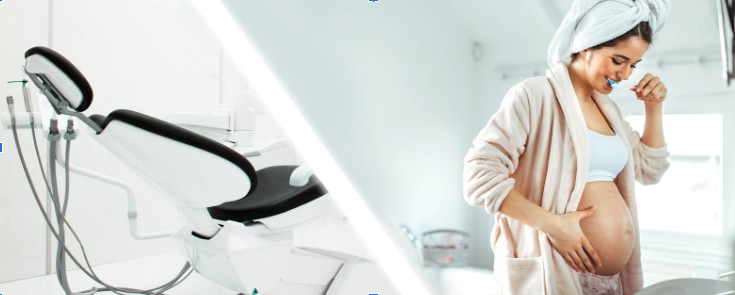| Note: This article has a purely informative role. Its purpose is to educate those at risk and to list the most frequent diseases. The diseases cited above are by no means a generality and are a summary of various medical articles.The symptoms listed should not be a source of remote diagnosis and in no way replace a visit to your doctor or dentist. |

Given the hormonal changes and the decrease in progesterone, it is observed that pregnant women are much more affected by dental problems during their pregnancy. This coincides with a period of pregnancy when pregnant women will naturally tend to focus their attention on other parts of their body. Without information, many will avoid dental treatment during their pregnancy. This is a fault which can lead to risks for the pregnancy.
In this article we deal with:
Causes of dental problems during pregnancy
During pregnancy, estrogen-progestogen stimulation has several repercussions on the oral cavity:
- Some oral immunosuppression leading to the proliferation of germs and bacteria
- A drop in salivary pH leading to the development of bacteria causing cavities, or periodontal pockets. This acidity can cause erosion of the enamel (especially when the pregnant woman is prone to vomiting).
- Hormonal variations can alter a pregnant woman’s food preferences, as the taste for sugar is increased.
For several years, periodontal disease has been suspected to be a risk factor for preterm births although the exact mechanism remains unknown.
In fact, a dental infection can cause and be the cause of many infections in every organ of the human body. The majority remain affected by patients with a genetic predisposition, immunocompromised patients as well as diabetics in whom more special attention must be ensured.
These complications can be prevented with good dental hygiene, an annual visit to the dentist, and timely treatment of gum disease.
As stated at the top of the page, cavities are the most common dental infection in the world and do not only affect children who eat a lot of sugars. Treating it remains essential and thus avoids many complications, whether at the oral level or more generally in the body.
Dental care during pregnancy
Ideally for your dental treatment, consult your dentist before your pregnancy to check or treat any cavities or to perform a scaling. If you are already pregnant, a visit to the dentist will be recommended during the 2nd trimester in order to preserve the fetus.
Also, during this period all dental care that does not require the administration of an anesthetist can be performed.
Anesthesia during pregnancy
Products with a local anesthetic action are molecules capable of crossing the barrier formed by the placenta. It is therefore important to be careful of the local anesthetics which will be administered to you by your dentist if treatment without local anesthesia is unavoidable. Their rate of passage of these molecules through the placenta depends on their affinity with plasma proteins. Simply put, some molecules will have an easier time crossing the placental barrier than others.
The most suitable articaine during pregnancy
The articaine, which has a binding rate of 90%, is the most suitable for pregnant women since it penetrates the placenta very little.
Lidocaine: The risk to the fetus is not proven
Lidocaine with a binding rate of 69% is potentially harmful to the fetus although no clinical analysis demonstrates its dangerousness. Indeed, many pregnant women have used local anesthesia using lidocaine and no case of malformation or fetotoxicity has been identified to date. However, for the sake of precaution, doctors and Professor Anveli strongly advise against the use of lidocaine during pregnancy.

